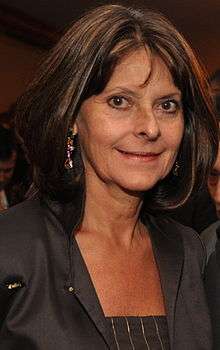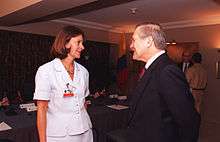Marta Lucía Ramírez
| Marta Lucía Ramírez Blanco | |
|---|---|
 Ramírez in 2012. | |
| Senator of Colombia | |
|
In office 20 July 2006 – 9 July 2009 | |
| 20th Minister of National Defence of Colombia | |
|
In office 7 August 2002 – 9 November 2003 | |
| President | Álvaro Uribe Vélez |
| Preceded by | Gustavo Bell Lemus |
| Succeeded by | Jorge Alberto Uribe Echavarría |
| 21st Colombia Ambassador to France | |
|
In office 1 February 2002 – 25 July 2002 | |
| President | Andrés Pastrana Arango |
| Preceded by | Juan Camilo Restrepo Salazar |
| Succeeded by | Miguel Gómez Martínez |
| 6th Minister of Foreign Trade of Colombia | |
|
In office 7 August 1998 – 1 February 2002 | |
| President | Andrés Pastrana Arango |
| Preceded by | Carlos Ronderos Torres |
| Succeeded by | Ángela María Orozco Gómez |
| 1st Deputy Minister of Foreign Trade of Colombia | |
|
In office 14 November 1991 – 12 February 1993 | |
| President | César Gaviria Trujillo |
| Succeeded by | Juan José Echavarría Soto |
| Personal details | |
| Born |
4 July 1954 Bogotá, D.C., Colombia |
| Nationality | Colombian |
| Political party | Conservative |
| Other political affiliations | Party of the U (2006—2009) |
| Spouse(s) | Álvaro Rincón (1984—present) |
| Children | María Alejandra Rincón Ramírez |
| Alma mater |
|
| Profession | Lawyer |
| Religion | Roman Catholic |
| Website |
www |
Martha Lucía Ramírez Blanco[1] (born 4 July 1954) is a Colombian lawyer and politician.
Elected Senator of Colombia in 2006, Ramírez introduced legislative initiatives to permit women to attain the rank of General in the Military Forces of Colombia, and to mandate English teaching in schools. Ramírez was Colombia’s first female Minister of National Defence, serving from 2002 to 2003 in the administration of President Álvaro Uribe Vélez, and the second woman in Latin America to hold this title. She has also served as the 6th Minister of Foreign Trade of Colombia, from 1998 to 2002.
In 2009 she resigned from the Senate to run as a candidate for the 2010 Conservative Party's presidential nomination, finishing third to the eventual Conservative nominee Noemí Sanín Posada. In 2014, she once again ran for the Conservative nomination, this time winning the nomination, but ultimately finishing third in the first round of the 2014 presidential election.
Personal life
Ramírez was born on 4 July 1954 in Bogotá, Colombia[2] to Álvaro Ramírez Suárez and Alba Blanco Venturoli, the eldest and only daughter of their four children.[2][3] In 1974 she married Álvaro Rincón, a Colombian architect; together they have one daughter, María Alejandra.[4] She is of Italian descent through her mother,[2] and thorough her father, she is related to Jesús Ramírez Suárez, her uncle, who served as Chamber Representative for Cundinamarca.[5]
A lawyer from the Pontifical Xavierian University, she has a Doctorate in Legal Sciences and Socioeconomics, and postgraduate specialisations in Financial Law from the University of the Andes, and in Business Management from La Sabana's INALDE Business School.[6] In 1996 she received a fellowship from Harvard University's Center for International Affairs, focusing on the internationalisation of the Colombian economy in the context of the rise of regional blocks and economic and commercial integration.[7]
Career
Minister of Foreign Trade
In 1997 Ramirez returned to Colombia as Noemi Sanin’s campaign manager who ran for office in 1998. When Sanin lost the race, the new president Andres Pastrana appointed Ramirez as Minister of Foreign Trade from 1998 until 2002. During this period she was rated as the best minister of Pastrana’s cabinet in several polls. Her most important achievements were the design and implementation of a 10 year Strategic Plan for exports, competitiveness and entrepreneurship policy for Colombia. At the end of Pastrana’s administration, Ramirez was appointed as Colombian ambassador to France. Only four months later, Alvaro Uribe was elected President and appointed Ramirez to become his Defence Minister.
Ambassador of Colombia in France
In 2002 Ramírez was then appointed as ambassador of Colombia in France for a few months. With the election of Álvaro Uribe as President of Colombia, Ramírez went back to Colombia.
Minister of National Defence

Marta Lucia Ramirez was the 20th Minister of National Defence the second woman in Latin America to hold this title after Michelle Bachelet who later became President of Chile. Ramirez served as Defence Minister from 2002until 2003. Her most significant contributions to Alvaro Uribe’s government were the design and implementation of a 10 year Democratic Security Policy and her focus on civilian control over the military in order to maintain efficiency and legitimacy of the military forces in the war against the Colombian guerrillas, paramilitaries and narcotrafickers. During her term in the Defence Ministry, she designed and implemented the massive demobilisation program for guerrilla members, which focuses on young guerrillas to combat the FARC's recruitment of child soldiers’ . Under the leadership of President Uribe, she also implemented the security of Colombian roads through a program called “Live Colombia travel through it”, and designed a program focused on transparency and efficiency in the military procurement. She also initiates a group of civilian advisors to implement a reform in the Colombian Police, in order to complement the military fight against terrorism in urban locations.After the ministry of Defence, Ramirez became a private consultant in trade and security. She then became advisor for the World Trade Organisation where she was appointed Chairwoman for the panel of experts at the Airbus-Boeing Trade panel. She resigned to run for the Colombian Senate in2006 where she was elected with a high majority of opinion votes in the U Party, a new political party organised under Uribe’s government.
Senator of Colombia
Elected as President of the International Affairs and Defence Commission in the Colombian Senate. As a senator she authored Law 1253/08 law for Colombian competitiveness; 1286/09 law for Science Technology and Innovation; 1190/09 law in favor of displaced people and different bills for public Universities, women protection, bilingual education and also presented political control debates to the executive branch. Due to her critics because of clientelism and corruption within the party, she organized dissidence with Gina Parody and Nicolas Uribe. Later Ramirez was against a third election of Alvaro Uribe as a Colombian president so she decided to resign from the party and the Congress. In 2010 she participated as a candidate for the Colombian presidency within the conservative party to which she still belongs.
References
- ↑ "Cinco candidatos se disputarán la Presidencia de la República de Colombia" (in Spanish). Bogotá: Colombia, National Civil Registry. 2014. Retrieved 21 May 2014.
- 1 2 3 Ortiz, María Paulina (17 May 2014). "Marta Lucía Ramírez" (in Spanish). Bogotá. ISSN 0121-9987. OCLC 28894254. Retrieved 21 May 2014.
- ↑ "Marta Lucía Ramírez, una mujer de 'armas tomar' que busca la Presidencia". El País (in Spanish) (Cali, Valle del Cauca). 9 May 2014. ISSN 0124-891X. Retrieved 21 May 2014.
- ↑ "María Alejandra". Jet-Set (in Spanish) (Bogotá). 2006. ISSN 0123-7918. Retrieved 21 May 2014.
- ↑ "Todo Sobre: Marta Lucía Ramírez" (in Spanish). Bogotá: La Silla Vacía. 2014. Retrieved 21 May 2014.
- ↑ "Perfil: Marta Lucía Ramírez" (in Spanish). Bogotá: La Silla Vacía. 2014. Retrieved 21 May 2014.
- ↑ "Fellows for 1996-97 Named at Center for International Affairs". Cambridge, Massachusetts: Harvard Gazette. 10 October 1996. Retrieved 21 May 2014.
External links
| Wikimedia Commons has media related to Martha Lucía Ramírez Blanco. |
|